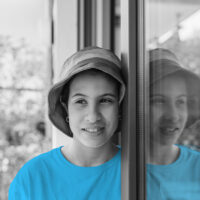Family factors
-

Interventions for Sibling Mental Health Conditions: New Systematic Review Shows Lack of Evidence
This blog offers a summary of the findings and implications of a recent systematic review of studies looking at the effectiveness of interventions for young people with sibling mental health conditions. Only four papers were included in this review, highlighting the lack of evaluations for interventions supporting these young people.
Read more -

Why do some children from low-income families manage to thrive cognitively?
Why do some children from low-income families manage to thrive cognitively? Our study sheds light on this question by identifying key factors that promote cognitive resilience. Blog by Dr. Divyangana Rakesh.
Read more -

Transgender and Nonbinary Youth – Supporting Families
Supporting families of transgender and nonbinary youth is crucial for positive mental health outcomes. Join Dr. Sabra L. Katz-Wise leading researcher on LGBTQ+ health and family functioning.
- Event type
- Introductory and Update Session
- Location
- LIVE STREAM
-

From Valencia to Understanding the Mental Health Impacts of Floods on Children and Young People
Floods are the most common type of natural disaster, with 1.81 billion people facing significant flood risk worldwide, particularly in low- and middle-income countries. Among those affected, children and young people are especially vulnerable due to limited coping strategies compared to adults and high dependence on caregivers. Despite this, research on the impacts of floods on their mental health remains scarce.
Read more -

Research Review: Child emotion regulation mediates the association between family factors and internalizing symptoms in children and adolescents – a meta-analysis
Open Access JCPP paper – ‘Various family factors impact children’s emotion regulation development, and in turn, contribute to the risk of internalizing symptoms in young people.’ Sylvia Chu Lin (pic) et al.
Read more -

Concurrent and prospective associations between family socioeconomic status, social support and salivary diurnal and hair cortisol in adolescence
Paper from the JCPP – ‘This study examined the role of stability and changes in family socioeconomic status (SES) in the prediction of multiple cortisol indicators and tested whether social support moderated these associations.’ Christina Y. Cantave (pic) et al.
Read more -

The interaction between polygenic risk and environmental influences: A direct test of the 3P model of insomnia in adolescents
Open Access paper from the JCPP – ‘This work sheds light on the complex relationship between genetic and environmental factors implicated for insomnia.’ Juan J. Madrid-Valero (pic) et al.
Read more -

Pathways from maternal depression to child resilience: Socioeconomic, family, and individual factors in the 2004 Pelotas (Brazil) birth cohort
Open Access paper from JCPP Advances – ‘These findings suggest that cognitive stimulation in early childhood may represent a modifiable protective factor for children exposed to maternal depression and a promising intervention target to promote child resilience in the context of maternal depression exposure.’ Jessica Mayumi Maruyama and Andreas Bauer (pic) et al.
Read more -

Measurement bias in caregiver-report of early childhood behavior problems across demographic factors in an ECHO-wide diverse sample
Open Access paper from JCPP Advances – ‘While studies have shown that demographic variables influence caregiver ratings of behavior problems, the extent to which the CBCL/1.5-5 functions equivalently at the item level across diverse samples is unknown.’ Shuting Zheng (pic) et al.
Read more -

Socioeconomic status and risk for child psychopathology: exploring gene–environment interaction in the presence of gene–environment correlation using extended families in the Norwegian Mother, Father and Child Birth Cohort Study
Open Access paper from the JCPP – ‘We applied a novel approach using extended family data to investigate the moderation of aetiological influences on child emotional and behavioural problems by parental socioeconomic status in the presence of modelled gene–environment correlation.’ Isabella Badini (pic) et al.
Read more